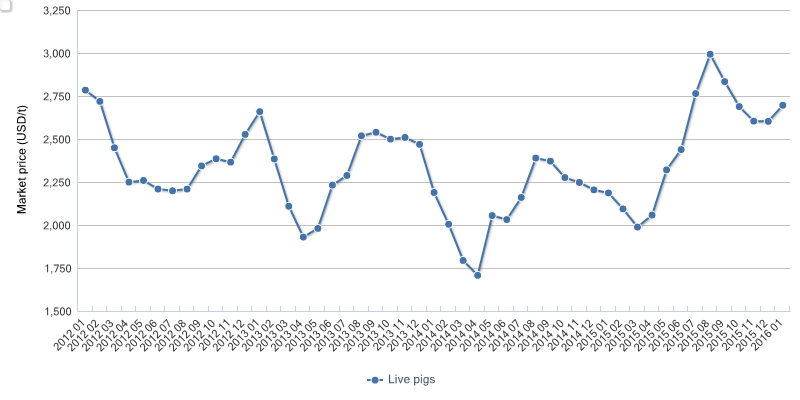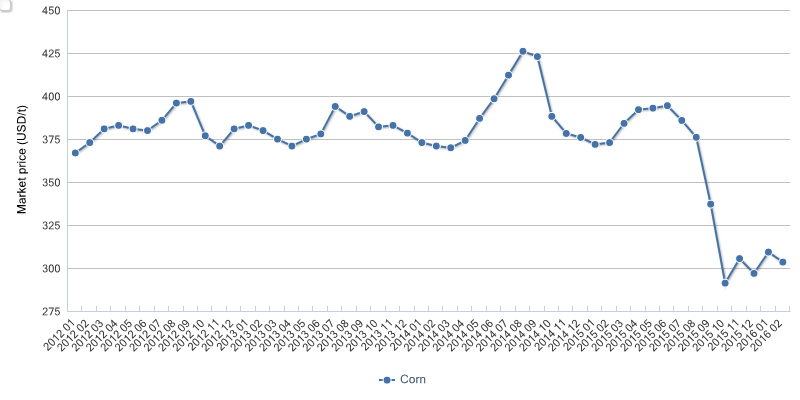Recently, Chinese feed enterprises have been entering into pig
farming, encouraged by environmental policies and the huge profit margins
in selling pigs and pork. Meantime, this may change the market risk and the
client area of the corn deep-processing industry in China.
Pig farming is becoming
popular among feed enterprises in China's feed industry.
On 1 Feb., 2016, Beijing
Dabeinong Technology Group Co., Ltd. announced that it will invest in four
projects during 2016, of which three are live pig industrial chain investments,
totaling USD24.41 million (RMB160 million). It will build up a comprehensive
industrial chain from boar breeding to commercial pig selling, and will
establish a farm which can hold 20,000 sows in 2016.
On 17 Feb., 2016, New Hope
Liuhe Co., Ltd. announced to invest USD1.34 billion (RMB8.8 billion) to farm 10
million live pigs in a project that has been described as "company +
family farm" within 3-5 years. It also plans to acquire 70% of Yangling
Besun Agricultural Industry Group Corporation Limited, a large pig farming
enterprise in Southwest China, aiming to establish a pig farming industrial
chain in this area.
Early in 2015, COFCO
Corporation, Chia Tai Group, Guangdong Wens Food Group Co., Ltd., Henan Chuying
Agro-Pastoral Co., Ltd., Muyuan Foodstuff Co., Ltd. and some large listed
farming enterprises announced to invest in building live pig farming projects.
Data shows that there were
35 large pig farming projects, with an accumulative investment of USD4.58 million
(RMB30 million) in China. The total investment exceeded USD10.68 billion (RMB70
billion) and 30 million of live pigs were sold.
There are two factors that
are driving Chinese feed enterprises into pig farming.
1. At present, China is
closing down small pig farms with annual sales of less than 500 pigs in order
to protect water quality at water sources. Also, the government is implementing
the most stringent pig farm relocation policy ever in Yangtze River Delta,
Pearl River Delta, Poyang Lake and Dongting Lake regions. In 2015, China
reduced over 30 million of pigs for sale due to environmental problems, among
which 3.95 million were reduced in Fujian Province. As a result of these
policies, small pig farms are forced to exit the market, leaving a sufficient
market gap for large enterprises to fill.
Small pig farms are being removed in China

Source: Xinhuanet.com
2. 2015 was the most
profitable year for China's pig farmers in the past five years. The price of
pork hit a record high for the most recent five years due to supply shortages.
At the same time, the price of corn, the major raw material of feed, also hit a
five-year low. The huge profit margin attracted a large number of investors.
Furthermore, since the Chinese government is likely to reduce its interventions
on the corn price in the future, the corn price might further decline. This
means that the costs of raw material and feed additives may reduce.
Market price of live pig in China, Jan. 2012-Jan. 2016

Source: CCM
Market price of corn in China, Jan. 2012-Feb. 2016

Source: CCM
The large-scale pig
farming will change China's corn deep-processing industry in two ways.
1. China's pig farming is
currently based on small farms. Additionally, farmers differ greatly in pre-judging
and controlling the market information, which results in largely fluctuating
numbers of pigs in different farms. Large-scale pig farming can be much easier
for the government to manage. Also, a stable farming scale is very important to
the corn and amino acid market because the steady demand can greatly reduce the
market risks.
Feed enterprises are
important downstream clients for corn products. As a result, feed enterprises
that raise pigs can create collaborative development for both the feed and corn
product industries. In 2015, the reduced number of live pigs in farms weakened
the demand for feed, DDGS, lysine, threonine, corn gluten meal and other feed
products. Their sales prices even declined to the production costs, which made
these products unprofitable.
2. The client area of the
corn deep-processing industry may change. China's pig farming will gradually
transfer from South China to North China. Therefore, feed enterprises are
likely to relocate to North China to be closer to their clients and the
production area of raw materials. As for corn deep-processing enterprises, the
different client area will also create logistics costs and cause changes to
inventory plans.

About CCM:
CCM is the leading market
intelligence provider for China’s agriculture, chemicals, food &
ingredients and life science markets. Founded in 2001, CCM offers a range of
data and content solutions, from price and trade data to industry newsletters
and customized market research reports. Our clients include Monsanto, DuPont,
Shell, Bayer, and Syngenta.
For more information about
CCM, please visit www.cnchemicals.com or
get in touch with us directly by emailing econtact@cnchemicals.com or
calling +86-20-37616606.
Tag: feed, pig farming, corn